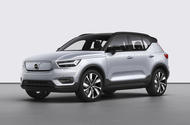Bjorn Annwall, head of Volvo’s EMEA region, believes sleeker models will be needed in the future
Volvo will continue to build SUVs in the Swedish firm’s fully electric future, but Björn Annwall has said their design will need to become optimised.
The head of the EMEA (Europe, Middle East and Africa) region for Volvo told Autocar: “We need to adjust the design of our future cars to find the right balance between consumer appeal and functionality and range. The cars will look different in the future due to that.
“The aerodynamics will become more important, especially if you drive at higher speeds on the motorway. They’re less important for city cars that are used for shorter distances because the aero doesn’t play such a big role here.”
Higher speeds on motorways tend to drain batteries disproportionately quickly because of the drag created at speed. But Annwall sees a future where the more urban-focused cars won’t need to focus on such a slippery drag coefficient. Divergence of design will be the key, to make sure that a car is fit for purpose depending on where it’s used.
Despite this variance, Annwall doesn’t expect a chop-and-change system of car ownership to be the solution to electric car adoption. Volvo is not interested in changing its subscription model to enable people to swap their car for the weekend. “Our subscription model is not meant to let people change their car like you change underwear. Longer range is the answer. And the availability of fast charging,” Annwall said.
Nevertheless, Volvo will continue to invest in the subscription model. By 2025, it wants 50% of its global sales to be online. It believes subscription has worked well since the UK launch in September, with a 93% conquest rate in the 500 subscribers to date. Market share is up, from 2.4% to 2.7%, although sales are down overall, like most manufacturers.
In the meantime, Volvo remains bullish about electrification. PHEVs will feature but, like Honda, Annwall sees these as a stop-gap. “For us, long term, it’s a full-electric future. PHEVs are a transition and a stepping stone. The only question is how long that [transition] is. Five years, 10 years – we don’t know how long. But the sooner Volvo becomes electric, the better Volvo is going to be in winning in the premium segment.”
READ MORE
Car industry must commit fully to electric vehicles, says Volvo boss
Volvo boss Håkan Samuelsson awarded top honour at 2020 Autocar Awards
Analysis: How Volvo’s subscription model is channelling Netflix
Source: Autocar
